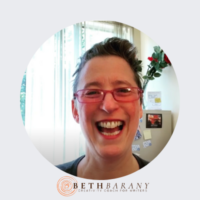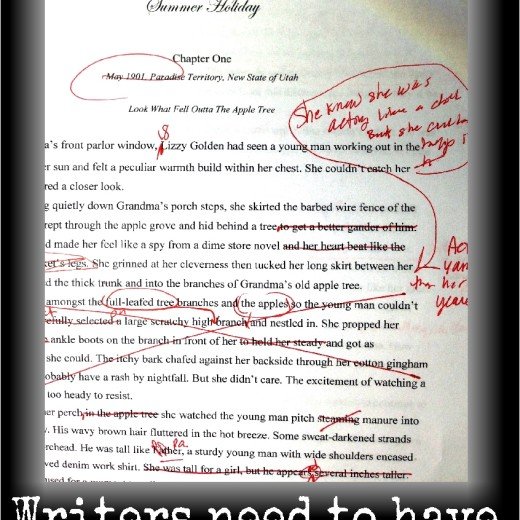Editing Tips to Help You Avoid Information Overload
Editing Tips to Help You Avoid Information Overload – How to Write the Future podcast, episode 70
“Stories come alive when they’re told from the perspective of a character.”
In “Episode 70. Editing Tips to Help You Avoid Information Overload” host Beth Barany, creativity coach, teacher, and science fiction and fantasy novelist, answers a listener’s question about when to stop adding ideas to your story and if it’s possible to kill your story by overworking it. Beth also invites you to come on the show as a guest and sign up for a free Story Success Clinic session to receive feedback and guidance on your work.
Platforms The podcast is available on Apple Podcasts | Google Podcasts | Buzzsprout | Spotify | Podcast Addict | Amazon Music | Youtube
RESOURCES
Sign up for the 30-minute Story Success Clinic here:
https://writersfunzone.com/blog/story-success-clinic/
Free World Building Workbook for Fiction Writers:
https://writersfunzone.com/blog/world-building-resources/
About the How To Write the Future podcast
The *How To Write The Future* podcast is for science fiction and fantasy writers who want to write positive futures and successfully bring those stories out into the marketplace. Hosted by Beth Barany, science fiction novelist and creativity coach for writers. We cover tips for fiction writers. This podcast is for readers too if you’re at all curious about the future of humanity.
This podcast is for you if you have questions like:
– How do I create a believable world for my science fiction story?
– How do figure what’s not working if my story feels flat?
– How do I make my story more interesting and alive?
This podcast is for readers too if you’re at all curious about the future of humanity.
Transcript for Episode 70 – Editing Tips to Help You Avoid Information Overload
Hey everyone, Beth Barany here for How To Write The Future podcast. This is a podcast for science fiction and fantasy writers who want to write positive, optimistic futures because when we vision, what is possible, we actually help make it so.
What we cover on How To Write The Future podcast
What am I talking about?
I am talking about craft. I’m talking about mindset. I’m talking about all kinds of futuristic things that can help us as a people and as writers.
Question from Our Listeners
And this week, I have a question that I am addressing from a fellow writer, a creative writer, who is wondering: when is enough information enough, or when is information too much? When do you stop adding ideas to your story? Is it possible to kill your story by overworking it?
So I’m going to address that question from Megan Shepherd. She’s given me permission to mention her name. Thank you so much, Megan.
About me and what qualifies me to talk about this topic
Just a little bit about me and why am I doing this podcast and what qualifies me to talk to you all about this.
So I am an award-winning science fiction and fantasy writer. I have, oh, I have, gosh, 16 books published. I have a young adult adventure fantasy trilogy called Henrietta The Dragon Slayer out. I have a four-book sci-fi mystery series, the Janey McCallister mystery series out. I’ve also written sweet paranormal romance novellas, and I have five books out there for writers. I teach. I coach, I consult. I speak. This is my passion- storytelling, and I’m even moving into filmmaking, which I will tell you more about another time. Excited about that.
Megan’s Question
Alright, so let’s come back to Megan’s question.
A little background she gives she says that some good fantasy that I’ve read has taken one element of fantasy and just evolved their world around it.
True.
Or the writer poses a question about a specific fantasy race in an interesting situation.
So I would call that a setup.
So, and then she gives a fun example: when did the first centaur astronaut enter space?
And that was like her fun spitball question.
She says: I know that every new aspect you add to fantasy can pollute the plot or just bog the reader down with explanations. However, it’s tempting to throw every possibility in if it fits with your particular world-building. And then she says: my questions are: when do you stop adding ideas to your story? Is it possible to kill your story by overworking it?
Beth’s Answer
And I would say, Megan, these are two separate questions. When do you stop adding ideas? Is one question.
Is it possible to kill your story by overworking it? The answer is yes.
And I can circle back to that.
More about Megan
And then, Megan added a little bit more for me to understand her question, which I found really useful.
Basically that she tends to have a surplus of ideas. And she’s noticed sometimes her stories can feel overworked.
So she says: when I sit down, I have all these possibilities swarming in my head. And it comes out in new scenes, new lore, but no real work is done. Or, I have too many ideas and I don’t know which ones to pick.
And so for her, she’s writing short stories and her goal is to complete a short story that she’s working on. And she’s been working on it on and off. It’s a pet project of hers. It was written originally for a friend and so she’s motivated to get it done for her friend.
Beth’s deeper reply
All right. What I’m sensing from her question – and I should say that I’m a very intuitive, whole-brained thinker, and at the same time, I have a lot of processes. So I have both the process side or procedural side of my brain working while I have this holistic, gestalt, intuitive brain that is processing mostly through my body and that’s how I understand intuition actually.
So, one of the big challenges that I see science fiction and fantasy writers have, and I’ve had it too, is you have so many fun ideas about your story, about your world, that you want the reader to know all of them. And so we put them into our story.
Bones of your story
And then actually, and maybe Megan, what you’re facing is that your story, the actual story, like the bones and structure of the story is getting lost.
So the first question I would ask is: Who is your main character? What do they want?
What is in their way? What are their challenges? And what would you like the outcome of the story to be?
We can really get lost in all the details and we can lose sight of those things. So if you’re writing point of view story, so writing scenes from one character’s point of view, or maybe you have multiple characters who get to tell different parts of the story. So each character you might trade-off between, one character and another or multiple characters.
And modern fiction writing generally frowns upon, or I should say modern readers, generally frown upon head-hopping. Meaning: In one scene. telling the story from multiple points of view. That can be really confusing. And it’s also really hard to pull off.
So if you are a beginning writer and you’ve written maybe a few stories or a few novels, I would say stick to one point of view for the book or stick to one point of view per scene.
Now this will ground your choices. Your character has their goal, has the reasons for their goal, their motivation, has their specific conflicts. What will life be like for them by the end of the story?
And that’s what you want to keep your eye on. And this can help you decide what material to show or not show.
What makes stories come alive
Stories come alive when they’re told from the perspective of a character. So if your character is that centaur astronaut, then does the centaur astronaut actually know the history of when the first one went to space? They may or may not know.
So one of the tricks that I use or tools I should say, is that interview my character about the history of their world, about the history of their current project, mission, goal. And they only know what they know.
So, this is one of the ways that you can stop adding in so much information is you just think: well, what does this character know?
Now, maybe your character knows the whole history and maybe your character has read a lot or has a lot of life experience that adds to them knowing so much about the problem.
But in the moment of your story in the scene, in the action, moving from here to there, they are not telling themself the Wikipedia entry, usually. Some characters might. And that will be part of who they are.
So in the moment of the action, is your character thinking all those details about the story world, or are they maybe only noticing one thing or two things?
So, this is where you want to use the body senses, all the body senses. I teach a class on this. I call it Beyond the Five Senses because we actually have a whole lot of senses. It’s not just the eye that sees, but the eye can see color or a can see brightness. That’s actually two different things the brain does for eyes, for example.
So, what is your point of view character notice in the setting that is relevant to the action moving forward in your story?
Use their own perception and memory and knowledge, and put in the bare minimum.
I’ve told my clients in the past. It’s on a need-to-know basis. Do they need to know it right now? Would they really be thinking this right now? Then put it in.
Otherwise, cut it. It is not relevant to the scene because your vehicle for telling the story is your point of view character and what they notice about their setting, what they know about their setting, what they experienced through through hearing, sight, smell, body experience, either from kinesthetic touch, which is – touch is actually many, many senses, the pressure of something, the texture of something, for example, and that’s just two. And there’s more. And then there’s also the sense of the body in space. That’s proprioception.
So those are just a few of the body sensing – that your body is sensing at any given moment. And what is absolutely necessary to describe right here in this moment?
And then going back to your original question, Megan. You said: when do you stop adding ideas to your story?
Write The Messy First Draft, and then Edit
So, can you let yourself write toward that end scene? And put in whatever details you want in the first draft.
Your first draft needs to be messy. Totally messy. Write in all the details that you want. And keep your attention on writing to the end of the story.
And then in revisions is when you want to ask yourself: Is this too much? Is this not enough?
And keep your attention on moving the story forward, moving your character through their conflicts and resolutions, conflicts and resolutions until you get to the end.
And if you’re writing short stories, like Megan is, then give yourself an actual page restriction. And that will force you to say, well, is this absolutely necessary? Is this detail, absolutely necessary?
If so, keep it in. Take it out just to see what it would be like.
What kind of song is your story?
So I would say: Your story is like a song.
What kind of song is it?
Is it a waltz that has a certain rhythm?
Is it a fast moving rock song?
Is it melodic flute, meditative piece?
Think about the rhythm of your story and what kind of song it is.
This is one way I think about how to edit my books.
And then, make a decision.
And then now edit your story, according to the kind of rhythm and pacing and emotional flow that you want to have, like a song.
All right. I hope that was helpful, Megan. Thank you so much for your question. I really, really appreciate it.
What are your questions?
If your listener has a question for me about editing your science fiction and fantasy novel, let me know. I would love to answer it in a future episode.
Be a guest on the Story Success Clinic
Or come on the show and be a guest. We spend 30 minutes looking at your work or talking about your creative mindset.
I will absolutely look at a paragraph or two, and we could do some live edits and we can talk about world-building, and we could talk about how do we mix pacing with setting, with character development.
So 30-minute Story Success Clinic. Every session is recorded and gets aired as an episode of How To Write The Future podcast. You get more exposure for yourself as a writer, I get to help more writers. It is a win-win situation.
All right, everyone. That’s it for now.
So write long and prosper.
Loved this episode? Leave us a review and rating here: https://www.buzzsprout.com/2012061
ABOUT BETH BARANY
Beth Barany teaches science fiction and fantasy novelists how to write, edit, and publish their books as a coach, teacher, consultant, and developmental editor. She’s an award-winning fantasy and science fiction novelist and runs the podcast, “How To Write The Future.”
Learn more about Beth Barany at these sites:
Author site / Coaching site / School of Fiction / Writer’s Fun Zone blog
CONNECT
Contact Beth: https://writersfunzone.com/blog/podcast/#tve-jump-185b4422580
Email: beth@bethbarany.com
LinkedIn: https://www.linkedin.com/in/bethbarany/
CREDITS
EDITED WITH DESCRIPT: https://www.descript.com?lmref=_w1WCA
MUSIC: Uppbeat.io
DISTRIBUTED BY BUZZSPROUT: https://www.buzzsprout.com/?referrer_id=1994465
SHOW PRODUCTION BY Beth Barany
SHOW NOTES by Kerry-Ann McDade
***
For more “How To Write the Future” episodes, go here.
If you’d like to invite Beth onto your podcast, drop her a note here.






